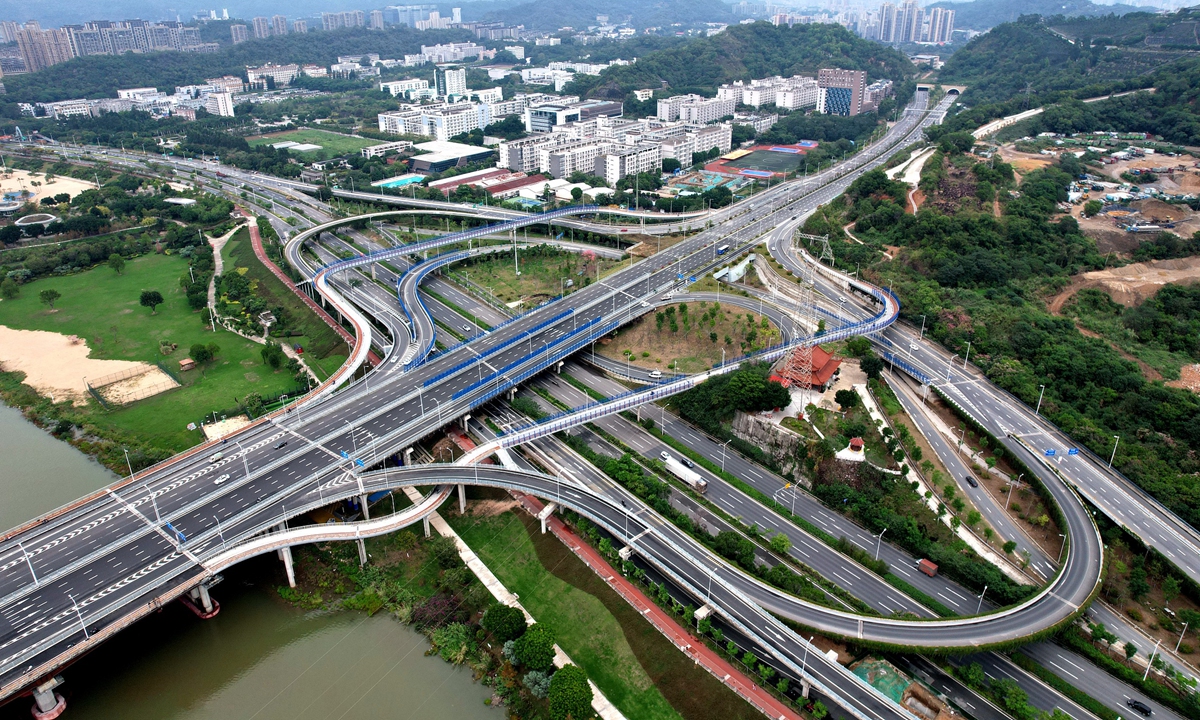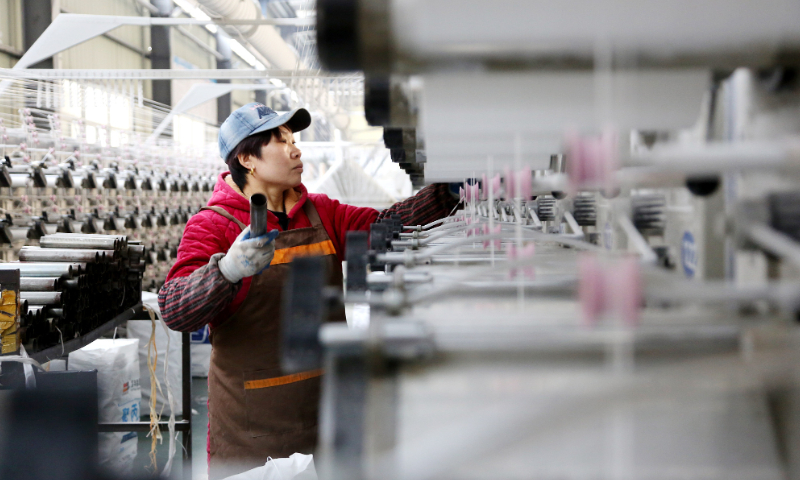
Photo: CFP
The GDP growth target set by China at the beginning of 2023 was around 5 percent. With the GDP growth standing at 3 percent in 2022, the 5 percent target is a goal that allows for sufficient flexibility. Based on the currently available economic data, it is already certain that China's GDP growth rate will exceed 5 percent in 2023.
Although we hope that China can achieve higher growth, the performance of China's economy in 2023 is still commendable compared to other major countries around the world.
The total retail sales of consumer goods in 2022 decreased by 0.2 percent compared to the previous year. However, from January to November 2023, it increased by 7.2 percent compared to the same period in 2022. This strong rebound in retail sales indicates a significant recovery in consumer spending as well as a low base in 2022 in China.
From January to November 2023, fixed asset investment increased by 2.9 percent year-on-year, lower than the 5.1 percent growth in 2022. Among them, investment in the manufacturing industry increased by 6.3 percent year-on-year, which is lower than the 9.1 percent growth in 2022.
But it is encouraging that in manufacturing investment, the electrical machinery and equipment manufacturing industry grew by 34.6 percent year-on-year, the instrument and meter manufacturing industry grew by 21.5 percent year-on-year, the automobile manufacturing industry grew by 17.9 percent year-on-year, and high-tech industry investment grew by 10.5 percent year-on-year. The rapid growth in investment in these specific sectors of the manufacturing industry is a positive sign.
In my opinion, the economic growth target for China in 2024 should not be lower than 5 percent. Since China's GDP growth in 2023 is projected to reach 5 percent, if China can achieve this level of GDP growth rate in 2024, it would represent truly a remarkable achievement because of the less important role of base effects. It is even more so, if taking into consideration the fact that global economic growth in 2024 is generally projected to be lower than in 2023.
It should be emphasized that China's GDP growth is to a large extent dependent on the Chinese government's policy options. Over the better part of last decade, China has experienced low CPI inflation and PPI deflation, while the GDP growth has been slowing. The Chinese government should adopt expansionary fiscal and monetary policies to stimulate the economy without worrying too much about inflation, at least in the short term. Policymakers should fully utilize this crucial policy space and strive for the highest possible economic growth to reverse the trend of slowing GDP growth and dispel the rising pessimistic expectations.
The contribution of final consumption and net exports to GDP growth in 2024 is expected to be lower than in 2023. Therefore, whether China can maintain an economic growth rate higher than 5 percent 2024 depends on growth in capital formation.
Currently, there are signs that the decline in real estate investment is narrowing, but it is expected that it will continue to decline well into 2024. The drag of real estate investment on GDP growth from real estate investment will decrease, but the possibility of making a significant contribution remains low.
Although the growth rate of investment in high-tech industries is encouraging, investment in these industries accounts for only a rather small proportion of total investment in manufacturing. The underperformance of manufacturing investment is likely related to the decline in the growth rate of real estate investment.
A back-of-the-envelope calculation shows that if the final consumption growth in 2024 is lower than that of 2023, which is almost certain because of the low base in 2022, to achieve a 5 percent GDP growth for 2024, the infrastructure investment growth rate needs to reach double digits.
The per capita income in China is only one fifth of that in the US, but its population is four times larger. China does not have the problem of infrastructure investment saturation, especially in areas such as healthcare, elderly care, education, scientific research, underground pipelines, and urban transportation. China's infrastructure facilities on the whole are behind that of developed countries and in some aspects, it is even inferior to some developing countries.
Infrastructure is largely public projects, and investment in public projects generally does not provide commercial returns and is difficult to generate cash flow. The funding for infrastructure investment should mainly come from government budgets. How to guarantee that investment in infrastructure projects is efficient and the projects are of high quality is a huge challenge the Chinese government has to face.
In October 2023, China announced an additional issuance of 1 trillion yuan ($137 billion) in 2023 government bonds, leading to an increase in the fiscal deficit ratio from 3 percent to 3.8 percent. This is a very important and a commendable development. This move signifies that the Chinese government will no longer consider the so-called "3 percent" and "60 percent" fiscal rules of the Maastricht Treaty as inviolable principles in the future.
In my opinion, in 2024, there should be a significant increase in fiscal expenditure to support infrastructure investment. Because China still has adequate fiscal space, the government should not be afraid of increasing the fiscal deficit rate to 4 percent or even 5 percent.
Given the low inflation rate in China, it is necessary for the People's Bank of China (PBC) to further relax monetary policy. Because of the endogeneity of the money supply, the PBC should rely more on interest rate policies. Monetary policy is a short-term macroeconomic policy and should target mainly at inflation rate rather than aim at allocating financial resources for specific industries and corporates.
Although there is still room for further monetary policy easing, it is also worth noting that while the economy is suffering from a sort of "liquidity trap," monetary policy should not be left alone "to pull on a string." Furthermore, a further relaxing of monetary policy is constrained by considerations such as the stability of the yuan exchange rate and the profitability of the banking system due to the narrowing interest rates margin between loans and deposits.
Interest rate cuts have positive effects on the stock market, real estate market, bond market, and local government debt. However, without expansionary fiscal policy, the stimulating effect of further loosening monetary policy on demand may be limited. In a low inflation environment, the cautious behavior of households and the risk aversion of enterprises will weaken the stimulative effect of interest rate cuts on consumption and investment.
On top of various reforms and structural adjustments, the key to China's achieving of the GDP growth rate target is to implement expansionary fiscal policy in a decisive way. To stimulate effective demand, the Chinese government should increase public expenditures significantly to support infrastructure investment. To finance budget deficit, the government should increase bond issuance correspondently. While fiscal policy leads the way, the PBC should lower interest rates to create favorable conditions for government bond issuance.
If there are difficulties in selling government bonds, the government can implement a Chinese-version "quantitative easing" policy, which involves the central bank purchasing government bonds from the open market.
In 2024, from a macroeconomic perspective, the top priority for the government is to avoid a debt-deflation spiral. For China, targeting at an inflation rate of 3-4 percent, or even higher, would be appropriate. In the past, the fear of inflation has been overwhelming. As a result, the Chinese government has been reluctant to implement expansionary fiscal and monetary policy. Now the macroeconomic situation that China is facing is very different from what it has experience before the global financial crisis. The current situation calls for the government to use expansionary fiscal policy supported by expansionary monetary policy to boost economic growth and market confidence. Only by doing so and combining with adequate reforms at various levels, can China reverse the persistent decline in GDP growth in 2024 and sustain a decent growth in the future.
The article was excerpted and compiled from China Finance 40 Forum (CF40) Research Department's interview with Yu Yongding, academic advisor to the CF40 and Member of the Chinese Academy of Social Sciences. The interview was first published on the CF40's WeChat official account. bizopinion@globaltimes.com.cn


